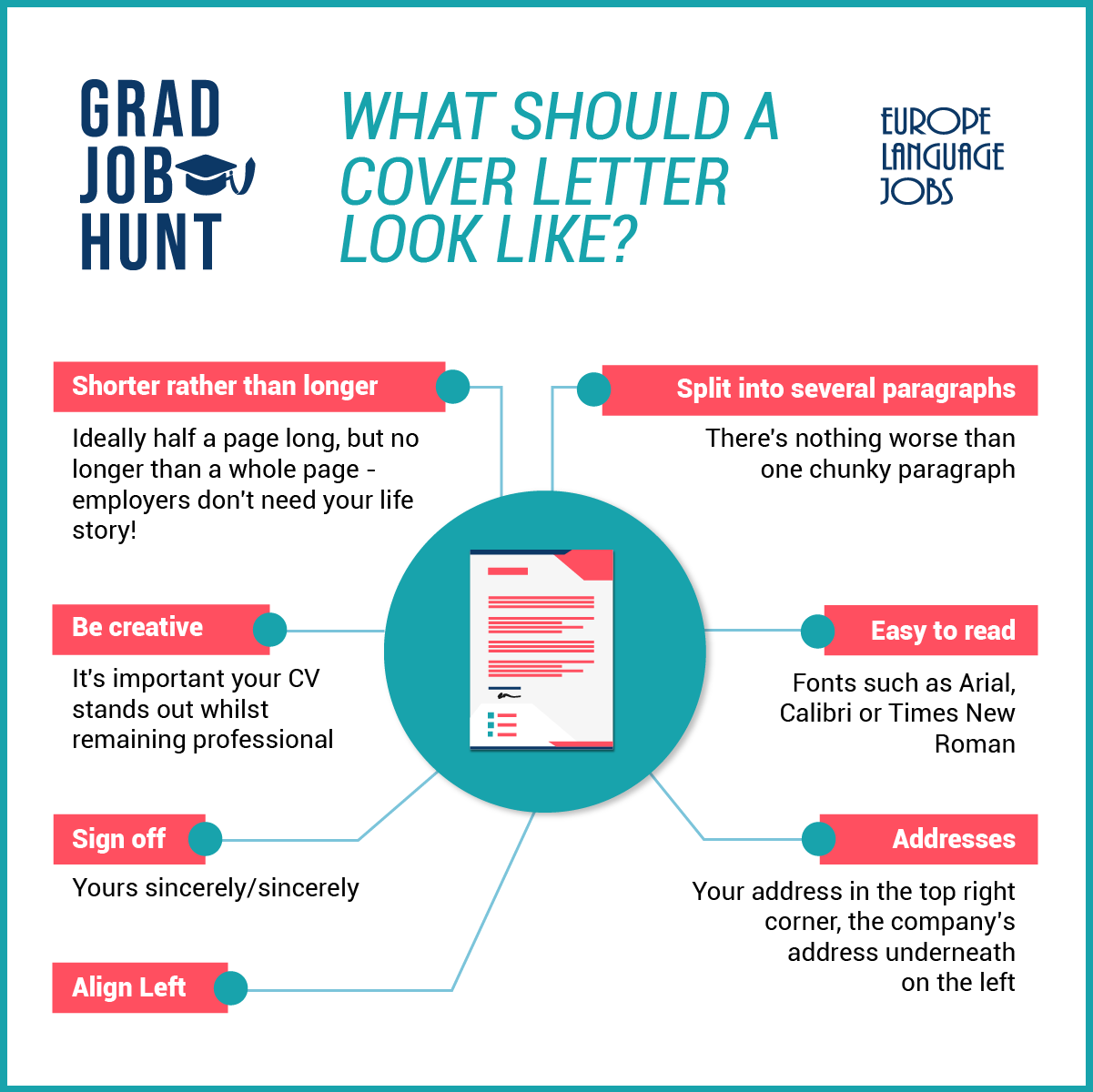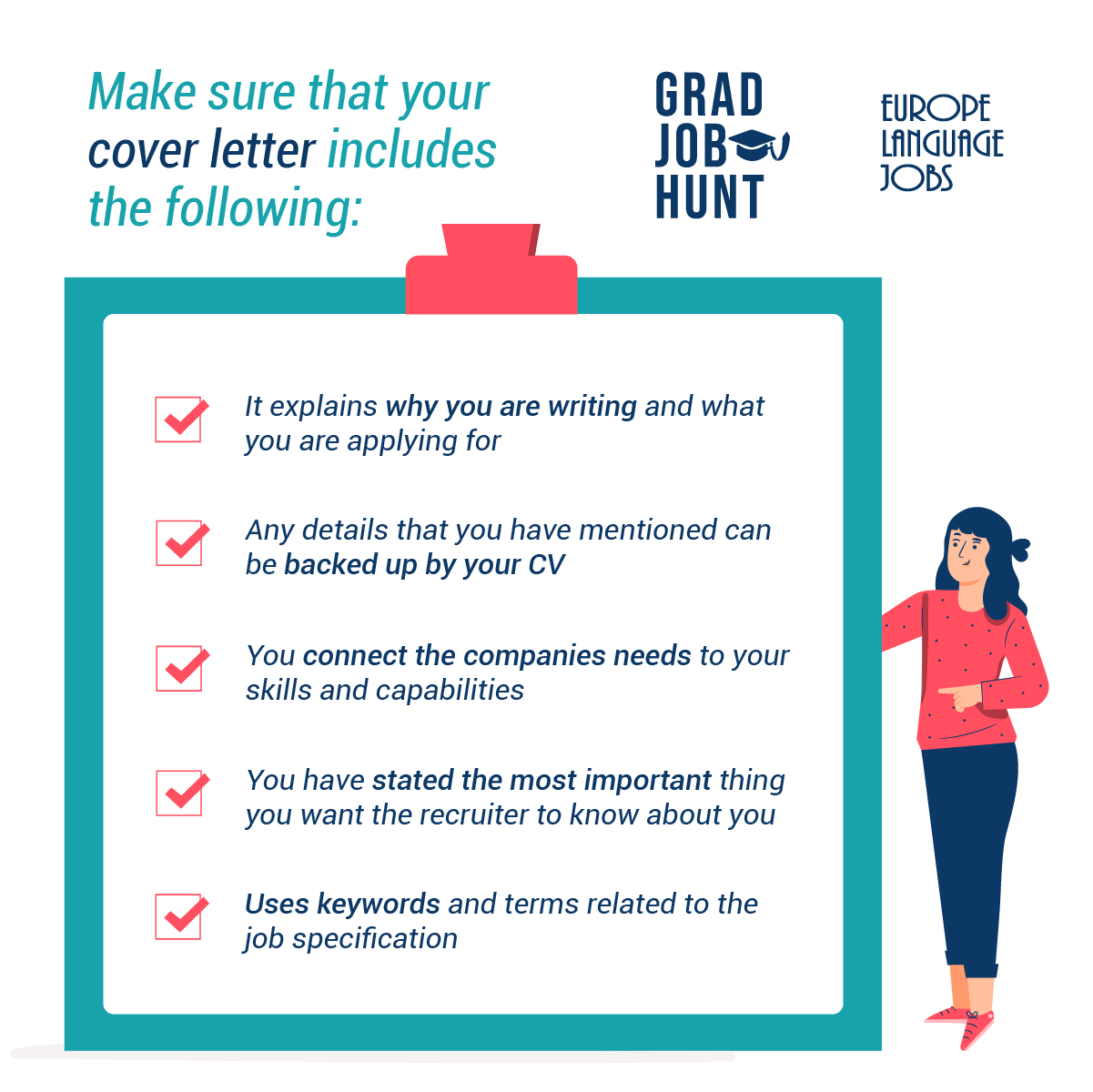When it comes to application documents, a CV should be clear, concise and informative, outlining your skills, experience and qualifications. Whereas your cover letter is your opportunity to make your application more distinctive to the company, it should be used to support your CV and to explain why YOU are the perfect fit for this particular opportunity. Many recruiters even state that a good cover letter could get you an interview, despite a lacking CV.
While some countries require cover letters more than others, such as the United Kingdom or the Netherlands, there is no specific list of countries to check. Whether you should or shouldn't include a cover letter in your job application will depend on whether it is stated in the description, albeit statistics show that recruiters are likelier to go through someone's application if there is one.
- What is the purpose of my cover letter?
- When is a cover letter necessary?
- What should my cover letter look like?
- How long should my cover letter be?
- What tone should I use in my cover letter?
- What should I include in my cover letter?
What is the purpose of my cover letter?
Your cover letter should be used to enhance your application, it should not summarise what you've already stated within your application. Thus, for each individual role, you should be personalising your cover letter to show your genuine interest in the position advertised. Your cover letter is your opportunity to add a sprinkle of your personality to your application!
When is a cover letter necessary?
A cover letter is necessary primarily when the employer explicitly asks for it in the job description. In such a case, an application without a cover letter might be automatically discarded by the recruiters. Failing to include a cover letter when asked to do it may be perceived as a lack of proper care and commitment or as a sign you haven't read the job description carefully enough.
However, it can sometimes be beneficial to send a cover letter even when you're not openly asked for it. It will demonstrate your motivation and add a personal touch to your application.
You should not send a cover letter if the job description says you shouldn't do it. Similarly, if a company's internal application system doesn't provide a way to attach a cover letter, it usually means including it is not necessary, or even unwelcome. If in doubt, find the contact details of a recruiter working in the company and reach out to clarify.
What should my cover letter look like?
Follow our infographic below to see what your graduate cover letter should look like:

Please remember that sending a generic, impersonal cover letter is not an effective job searching technique. The whole point of the cover letter is to outline what you can bring to this particular company and role. Always refer back to how your personality and your experience can lead to your success in the position. So make sure that you devote significant time and effort to help your application stand out, and to show the employer that this opportunity is made for you!
How long should my cover letter be?
Just like your CV, your cover letter should be concise and to the point. Recruiters prefer a half-page cover letter, containing as little as 250-400 words. You may be concerned that, by sending such a short cover letter, your efforts will be overlooked. However, stats show that this is exactly what most recruiters want to see. Do your best to stick to this advised length by avoiding any unnecessary waffling and get your message across in a short, yet powerful way.
Recruiters and hiring managers are busy people, so avoid sending them anything longer than 1 page. A cover letter that is too long is likely to put them off reading it altogether. Be sure to get the balance right and sum up your best points as quickly as you can to impress your dream employer.
What tone should I use in my cover letter?
Avoid writing a cover letter that is too formal. As we mentioned, this is your opportunity to let your personality shine, so do your best to avoid using formal, robotic language and try to show your voice within the cover letter. You need to prove that you are a good cultural fit for the company by using a friendly, yet professional tone.
Remember, this is your only chance in the application process to show yourself off to the employer before you meet them face-to-face. However, keep in mind that you are not presenting yourself to a new potential friend in your life - character traits or likes, which have nothing in common with your role, should be kept to yourself.
Extra tip: To ensure that your cover letter flows naturally, read your cover letter out to a friend or family member. This will help you to decide whether your tone is too formal or whether it reads in a friendly, approachable way.
What should I include in my cover letter? The ultimate cover letter checklist:
Your cover letter is your chance to introduce yourself on a personal level, and to express why you are the perfect fit for their job role. To clearly display your interest, you should begin your cover letter with why you are writing and what you find most appealing about the company and the position you are applying for.
By providing specific details and keywords about the company and the job position, you can prove to the employer that you have researched both the company and the position. As you can imagine, receiving a generic cover letter is extremely off-putting to recruiters and can significantly weaken your application. That is why it's extremely important to create a unique cover letter for each position that you apply for, matching the company's needs to your skills and capabilities.
Remember, simply telling the employers what your skills are isn’t enough. You need to demonstrate how you can apply your skills and experience to this position and their company. As a graduate, it’s normal to be lacking in experience, so we recommend mentioning any relevant personality traits or achievements gained during your degree and how you can implement these to help the company reach its goals. Make sure that the things you mention within your graduate cover letter can be backed up by your CV.
Feel free to download our graduate letter checklist to use for future reference :) You're more than welcome to share it with anyone who might need it, too!
Graduate cover letter example (you can use it as a cover letter template, but never copy-paste it!):
Dear (add hiring managers name),
I am writing to apply for (add position) that I found advertised on Europe Language Jobs job board. (Company name) is (add details about the company) an innovative company and a leader in the (sector) industry. As a dynamic (add your industry) graduate with a strong passion for (add your passions, interests), I’m confident that I would be a valuable asset to your team at (company name).
Your job requirements mention a need for someone who is (add skill) with experience in (add skill). From my experience at University, I gained key (add skill) skills and as a particularly (add personality trait) individual, I am confident that I can effectively apply this industry knowledge and essential skills to this role.
These strengths, partnered with my strong interest in the (sector) industry, will help me to make a positive and powerful impact at (company name).
I look forward to discussing the (add position) position and my qualifications with you in more detail. I’m available to talk at your soonest convenience.
Thank you so much for your time and consideration.
Sincerely,
[Your Name]
Key points to remember for your cover letter:
It needs to be easy to read
To encourage the recruiter or hiring manager to read your cover letter, you need to ensure that it looks inviting. Use easy-to-read font and font size and separate your writing into paragraphs. Avoid using any long, complex sentences - the shorter, the better. After all, your application is likely to be one of many, so don’t put the recruiters off just by looking at it.
Check, check, and check again
It’s always important to check your cover letter before you send it to the hiring company. Something as small as a typo or spelling mistake could cost you an interview. For this reason, taking a couple of minutes to read your cover letter will always be worth your while!
Having lots of little mistakes in your cover letter could show carelessness and will fail to display your seriousness about the position. As we mentioned previously during the event, written communication skills are extremely important to employers so make sure that you haven’t made any grammatical errors and prove your attention to detail!
Make sure it's personalised
Yes, we've already said this a million times, but it can't be stressed enough - cover letters are meant to be unique, explaining how you would benefit that specific company and role. Recruiters and hiring managers know when they are receiving a generic cover letter, so show your interest by creating a personalised one, matching your profile to theirs.
Lastly, how to send it
Companies will usually specify how they would like you to send your cover letter. Whether it’s through a job board, attached to your email or as an email cover letter itself. We recommend writing your cover letter in the format of a Word doc. This makes the recruiter’s life considerably easier when it comes to opening the file. Sending your cover letter in any uncommon formats can cause issues when opening and it’s important to make this process as easy as possible for the recruiter.
We hope you have found a useful tip or two in our complete guide for graduates. Now that you know how to write the perfect cover letter, you can create a winning first impression with your dream employer. Follow the guidelines to ensure that you stand out from other graduate job-seeker competition. It's extremely important to put a considerable amount of effort into this initial part of your job search to ensure that you start your job search off on a good note. Best of luck!












Sandra Caicedo1y ago
Best regard. Thank you. In my country it is not customary to write a cover letter, and usually employers do not request it, so this information has been very useful to me.
Best regard. Thank you. In my country it is not customary to write a cover letter, and usually employers do not request it, so this information has been very useful to me.